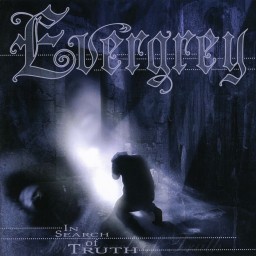Reviews list for Evergrey - In Search of Truth (2001)
To help with the list and to further prepare myself for the eventual spin of their 2024 album, I'm tackling Evergrey's In Search of Truth next. This will mark the 20th album I've heard and reviewed for the 2nd Decade prog metal list challenge. I'm not that big on Evergrey, as I've only heard two of their albums before: Solitude Dominance Tragedy and The Atlantic. I liked 'em, didn't love em, and just got off the back of listening to all four Disillusion albums. I started this album hoping it would astound me, but I didn't expect it.
The Masterplan goes right into the prog power metal you'd expect from classic bands like Manticora. But this has a bit more authentic heaviness to it. It immediately sets a standard that I want to keep following, but then Rulers of the Mind takes a mystical chime approach with a haunting production sound that's as magical as some dark fantasy story. I'd know. I've written one. The switch from power metal to goth metal is perfectly natural due to the band's love of solos and epic delivery, as they know when to pace these things. Even when a song has a guitar solo a literal third into it like Rulers of the Mind does, it just adds to the mystique and intrigue that this album set up with The Masterplan. On top of this, there is NO WAY that I can deny relating to these lyrics. They perfectly describe what it's like to try and find out who you are in a world where everyone wants to control you, despite the fact that they brag about freedom. Again, I write about this stuff. Rulers of the Mind covers a wide range of prog metal vibes and atmospheres in six minutes much like Bohemian Rhapsody did.
So the five-star rating was starting to look likely two tracks in, but I was still careful. Next is Watching the Skies, which uses dramatic violins in a similar fashion to Disillusions Back to Times of Splendor. The real clincher of the song's intro, however, is that perfectly-produced breakdown. It's much more simple and produces a clever drama backed up by the heaviness. In a way, it takes 180's while staying true to the album's previously established presence. It DOES get a little more complex by the end, but again, it doesn't lose its grip. Next is a two-minute piano segue, State of Paralysis. It's very nice and it fits, but I've heard so many piano segues at this point that it's a bit difficult to build a strong attachment to those. The Encounter is a more fast-paced power metal track that builds itself on heavy activity. It was at the point to where the album was merely rearranging elements of past songs for new purposes, so the originality was harmed despite the fact that the song was good. This told me that the five-star might not happen. All I had to do was compare like songs to like songs and see if enough of them amazed me. Considering the half-and-half behavior, likely not.
Mark of the Triangle started slow, but it built itself on neoclassical piano and a perfect presence that relied on being drawn out, like I was being lead through a tunnel where some great treasure everyone wanted was waiting at the end. This is another kind of song that switches things around every 20-30 seconds and remains consistent. It showcases the band's love of instrumentation. Even though none of them are the best metal musicians on Earth, their harmony is incredible. Next thing you know, low-key pianos bring me to the freakin' House of Usher. This is Dark Waters, a slightly creepier and slower song that cranks up the gothica. With this one, the band's more focused on maintaining the song's presence as a song rather than the instrumentation. The melodies here are some of the best on the whole album. Different Worlds starts of with serenity, which was needed at this point considering how much of the album was focused on energy. This didn't stop the pianos from caving into the love of glitter and melody. The album ends with Misled, which starts off even more quietly... and punks you with heavy guitars stomping all over you at mid-pace. The slower, slightly classical approach is a good one to end such a dramatic album with, and the band is doing everything the can to make this an epic, operatic ending without overdoing it.
This is way beyond what I generally know Evergrey for. This album might share many similar elements between most of the songs, but it's always trying to do some fancy things with the atmosphere and the instrumentation at the same time. There's gothic glitter, high-energy power and some deep mystique. This is enough to make me go back to Solitude Dominance Tragedy and re-evaluate it. I was hoping it would make at least the bare minimum for five stars, but instead I'm gonna give it almost the bare maximum for four-and-a-half stars.
Honed Consistency
Despite Progressive Metal being one of my preferred subgenres, I've recently realized that my knowledge and scope of the genre has been admittedly lacking. Evergrey's earlier catalogue has been one of those instances, considering I've spent the most time with these Swedes from 2019 and beyond. The Atlantic captivated me at the time of its release and caused me to blitz through their earlier discography without a whole lot of retention, but it became swiftly apparent that Evergrey are rock-solid musicians and very consistent in their quality. Consistency eventually comes at a price though, with Escape of the Phoenix and especially A Heartless Portrait: The Orphean Testament showing signs of a waning formula that produces solid but sometimes sterile results. So, in going back to one of their predominant albums, it gave me a chance to analyze a more primed and inspired Evergrey to really nail down what made this band one of the most dependable and unwavering Progressive Metal bands of the early 2000's.
The more that I peruse Evergrey's discography, the more I realize that I enjoyed The Atlantic more than most due to its well crafted, prevailing themes and atmosphere, and In Search of Truth shows that they've been accomplishing that level of storytelling even towards the beginning of their career. While I can't say I personally care for the tape recordings gimmick due to it being a bit too dramatic for my liking, the shadowy and slightly more Gothic atmosphere is extremely well done and consistent throughout the album. The eventual culmination of the recordings and the breakdown of the main character during "Different Worlds" didn't really stir any emotions in me, despite it being a powerful moment in the album on the whole. The keyboards and strings are a massive component of In Search of Truth's mysterious atmosphere and while they serve their purpose in carrying a ton of melody and creating interesting backdrops to the riffing, tracks like "Rulers of the Mind" definitely sound a bit cheesy despite warming up to it over the course of a few listens. Evergrey's riffs and overall songwriting choices have always been tight and airing on the simpler side for Progressive Metal though, so this allows the more supplemental instruments to take a few more risks without it sounding like a jumbled mess. The production and mixing of these different elements isn't as all-encompassing as their modern albums, which thankfully lets Tom Englund's top class riffing feel more aggressive and biting compared to their more bombastic but slightly more sterile modern production. There's a distinct and beneficial separation between the synths and guitar that allows each to shine through, but it can decidedly be a bit awkward for the synths at times as they aren't exactly seamlessly incorporated and stick out a tad too much sometimes. Evergrey's riffing style remains evergreen as there are a ton of familiar grooves like the quintessential, sweeping scales of "Watching The Skies" which, with the differences in guitar production, makes modern versions of the idea like "Blindfolded" feel a bit lackluster in comparison.
One aspect that has changed, however, is the vocals. Englund on In Search Of Truth is rawer and almost never goes into the clearer and cleaner style of the modern albums. He always has a scratchy gruffness which adds to the more aggressive and darker tone of the album, but in tandem makes certain slower and softer parts of songs fall a bit flat. His delivery on "Different Worlds" is fantastic, but choruses like "Ruler of the Mind" feel a bit too raspy and out of place, maybe benefitting from the clearer and more powerful style of their modern material. The interlude ballad "State Of Paralysis" is confirmation that Englund can also handle a brief but dynamic stint in the spotlight without bogging down the album's flow. Overall, the vocals do a fantastic job of selling the shadowy atmosphere in a way that they can't seem to capture on their newer releases, since these vocals have so much more identity to them.
In Seach of Truth has made me realize what I respect about Evergrey, though, and that's their ability to make Progressive Metal more approachable by removing a lot of the bloated aspects of the genre. While I think that the band as a whole is lacking some sort of spice that makes Progressive Metal truly special, there's an amount of deserved recognition to be given to a band that can successfully distill the tropes of the genre into tight, compelling packages. There are still enough twists and turns to satisfy a devotee's hunger, the needless detours and extended instrumental instrumental sections are trimmed in favor of more snappy solos and relentless grooves to keep the album moving along with fantastic pacing. This approach leaves something to be desired throughout In Search of Truth's entirety, but I'll absolutely take it over another hour and a half of bland and bloated Progressive Metal any day of the week. With the absence of massive highlights, though, the lower points of the album shine through a bit brighter than normal. "Dark Waters" remains a confusing song to me as I don't think the operatic interludes exactly work out despite the harrowing piano opening trying desperately to set the Gothic atmosphere.
I'm unsure as to whether I would call In Search of Truth a true Progressive Metal classic considering how tame it is compared to its contemporaries, but at the same time, it showcases a band that is incredibly consistent and creative without overstepping their boundaries in a genre that is notorious for being a bit too full of itself. Despite having a soft spot for their modern material, In Search of Truth is able to showcase their fantastic vocals, driving riffs, and seamless supporting keyboards in a rawer and honestly more compelling fashion. I don't think this album is in a league of its own compared to the rest of their own discography, but I do think it's their strongest showing by a thin margin.


 Rexorcist
Rexorcist
 Xephyr
Xephyr